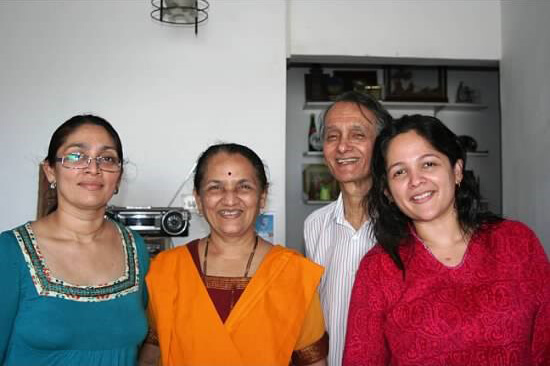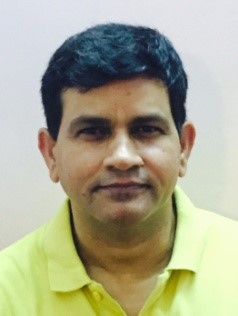My life, my times :
Interviewer : Dr Banwari Sharma, Interviewee : Dr V R Joshi
I had no formal training in rheumatology. Therefore,I learnt clinical rheumatology at RNHRD, Bath, laboratory techniques at Hammersmith hospital, London,and trained our biochemist at Dr. Malaviya’s laboratory in relevant rheumatology laboratory techniques. Establishing the tests was not easy. e.g. we collected rat livers from pharmacology department, microsectioned the livers in anatomy department, performed IF staining, and walked ½ km to a municipal hospital that had the microscope to report the slides. Wemanaged to establishthe relevant tests.
Because thesetests were not available in most hospitals & private labs,we had references a plenty,providingrich clinical material to learn from& teach. Training of students was essentially clinical.The resident or lecturer would independently examine the case, and present it. I would examine and discuss. This pattern was followed at Hinduja Hospital also. They thus learnt from each case. Further I encouraged students to participate in conferences, and clinicalmeetings, write papers as principalauthor andadvised, and helped the students tohave a stint abroad to widen their experience.Most of them are noweither full-time or part-time rheumatologists. One deficiency inthe training was lack of training in laboratory techniques.
CMEs, lectures, in and out of Mumbai, were important week-end activities that contributed to increased recognition and interest in the speciality.
Last hurdle in the initial stages was convincing the hospitals to appoint a rheumatology consultant. Once appointed they did an excellent job & now all hospitals seek a rheumatologist.
Presently rheumatology in India is urban based. To serve poor patients, patients in remote places we need a tier system. If we train UG students in essentials of rheumatology, they as G.P. can provide primary care to many rheumatology patients and refer needy patients for specialist guidance and management. At the next level could be senior internists who have had proper exposure to rheumatology. They can manage most of uncomplicated patients. Fully trained rheumatologists can tackle difficult problem cases, teach, and train students, do research, in short establish centers of excellence. Another requirement is (simple)practical criteria for diagnosisof common rheumatic ailments and affordable effective treatment guidelines. This may or may not lead to remission but even 50% improvement matters to a patient with family responsibilities. It would reduce quackery.
I do not know why. I did nothing out of the way, but what is expected of a doctor. Made no discrimination between poor and richpatients, didmy possible best, and did not go after money. As a teacher, tried to follow the examples of my teachers. Their devotion to teaching was exemplary. My ward rounds with residents were a combination of patient care and teaching (intermittently with students also);did not indulge in politics and gossiping, (no interest, no time), did not canvass for any honours or recognition and made a conscious effort to have cordial relations with all. For me there were no enemies, or rivals. However, I am quite aware, I did falter at times.
There is no one coat that fits all. It all depends upon the situation, the mental state of relations, and the rapport with the patients and their families. This is critical when a new (to you) patient gets admitted to ICU. Relations wonder about the doctor in-charge, when will he see the patient how will he treat etc. The first interaction is critical. Patient’s relations must develop/have faith in you.
Thus, when one of my old patient died in the hospital, the relations (after few days) thanked me for the advise of not having shifted the patient to ICU explaining its futility. They presented me with a “Ganpati”, as a token of gratitude.
In another case, inspite of receiving, by mistake, 5 gm IV CPM & not 0.5 gm and going through the side effects, continued to follow-up with me. I had told the patients mother about the error. Accepting mistake is important. However again one does not always succeed.
I am not a great researcher. Mostly,I did clinical studies. Sought answers to clinically relevant questions or seek relevant information about the pattern of our diseases. The real ‘researchers’ were students, both medical and non-medical. My role was to provide facilities, guide, correct, and edit their papers and thesis.
No, not Bhagwat Geeta but my father & teachers. My father was a Govt. Medical Officer & on retirement a private practitioner. Often he had to do night visitsto sick patients from adjoining villages, travelling on ‘Chakda’, an inferior version of a bullock-cart. He did not count the fees patients paid. Checked that the patients had purchased the right medicine.At night he would regularly read “Antiseptic” a popular medical journal then. He was my inspiration, my idol, a true “karmayogi”.
For our teachers teaching & patient care was in their blood e.g. Dr. Nigam, would take 3 lectures per week the year round, conduct two teaching ward rounds per week the year round, (5-6 patients per day) the rounds lasting 3 to 3 ½ hours.In the OPD students presented cases to him & he discussed.There was always something or the other to learn from the teachers.
Family was neglected, in retrospect a big personal loss.
I lost my mother in early childhood; grandmother took over our care. We would be with father only during vacations. Missed paternal care.
My elder brother is PhD in Botany. My wife hails from a PhD family. MD in Obstetrics and Gynaecology and Ph. D. in biochemistry,she retired as deputy director from NIRRH,and now works in an honorary capacity with Kasturba health society and an Ayurvedic hospital. She is a “visharad” in Indian classical music.
My elder daughter is MD (Paediatrics), left clinical practice (when Assoc. Prof. of Paediatrics) and is with an NGO. Married, she has 2 children.
Younger daughter is MBA and M.Sc. in epidemiology. After 16 years stay in USA, she has come back.
We are a small, happy, caring family.

Dr V R Joshi with family

Dr Banwari Sharma, Rheumatologist, Jaipur















